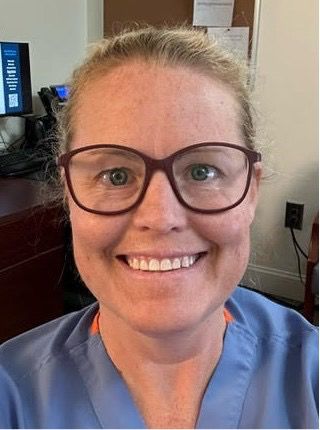
Meg Jewett's dedication to her patients is proof that she’s doing the right job in the right place. Whether she’s walking alongside a GW Cancer Center patient as they navigate their cancer journey, taking her rescue dog, Scout, for an early morning jaunt, or envisioning a better life for residents of an animal sanctuary, her nurturing nature shines through. As a vital team member, she played a pivotal role in bringing the Cancer Center’s new apheresis program to fruition.
What’s your story?
I became a nurse because my parents didn’t want me to go to college without a major. At 17, I really wasn’t sure about what I wanted to do or be for the rest of my life, and two of my best friends were going to nursing school, and I thought, “Well, that sounds good.” So, I became a nursing major at the University of Delaware, and 23 years later, I’m still a nurse. (Side note: one of the friends is still a nurse, too, and the other teaches in an elementary school.)
My first job out of college was at Johns Hopkins. I ended up making a lot of friends in DC and Northern Virginia and transferred to this area. Then, a former supervisor brought me to the GW Cancer Center about 13 years ago, and I’ve been here ever since.
What gets you out of bed in the morning?
Literally, my dog, Scout. He’s a 100-pound boxer-pit bull rescue, and he comes tiptoeing to my bed at 6:30 in the morning. Every morning. He’s turning ten this week. (Happy birthday, Scout!)
A big part of what gets me out of bed in the morning is the people I work with, both patients and co-workers. Over these past 13 years working here at the Cancer Center, I've made some of my best friends, and I get to see them every day. Also, helping people who are going through some of the hardest times of their lives is very rewarding, and that’s something that not everybody gets to do professionally. It really is an honor to be doing this work.
When I started here, I was doing infusions and chemotherapy. About a year ago, I was presented with the opportunity to learn about apheresis, and I jumped at the chance. Later, I was hired to help create the apheresis program, and it’s been very exciting to be a part of the team making this happen.
What is that one book that has influenced you the most?
My favorite book is The Nightingale [Kristin Hannah]. Historical fiction is my favorite genre. This book is about two sisters and their work for the French Resistance during World War II. But it’s really about relationships. It’s about good people coming together in times of strife, during a terrible war, to fight evil, and to save many, many lives. We don’t always see the good in people on television or in social media, but it’s all around us, and this book is a great example of how most people have good hearts and really want to help. It’s within each of us, and I don’t think those good qualities are recognized enough.
You and your work have made a difference for many patients. Is there one patient who made a difference for you?
It’s hard to point to just one patient because, right off the bat, several come to mind. And really, it’s often the person who comes with the patient who stands out. That person might be their spouse or partner, a family member, or a friend. But no matter what the relationship is, they stick with it through thick and thin and don’t let the patient go through their cancer treatment alone.
There is a couple that I’ll always remember from my very early days in oncology. She was a young woman, probably in her 40s, and diagnosed with Stage 4 colon cancer. She and her husband were so fun-loving and full of life. She actually lived for about six years with her disease, which, even now, is a long time with a Stage 4 diagnosis, so I got to know them pretty well.
She would start her chemo treatments on a Monday and take a pump home with her that infused the medication Monday, Tuesday, and into Wednesday. They had this wonderful tradition on a date night the Sunday before treatments started. Those Sundays were when she felt her best; she could eat whatever she wanted, and the food was still delicious. It was their special time together. Their relationship was great, and they were great to be around. Even though she was facing a terminal disease, they were always positive. They made the most of their time together and made wonderful memories together. They were the kind of people I could have been friends with if I hadn’t met them at work.
What’s the most interesting thing we should know about you?
If I wasn’t working at the Cancer Center, I would love to work at an animal sanctuary. I love animals – they all deserve to be loved and cared for. They’re pure joy. As long as you’re taking care of them and loving on them, they show it right back. I’d want to work with dogs or farm animals. Pigs are great animals. They’re smart, have so much love, and have such sweet smiles. Plus, they are amazing cuddlers



